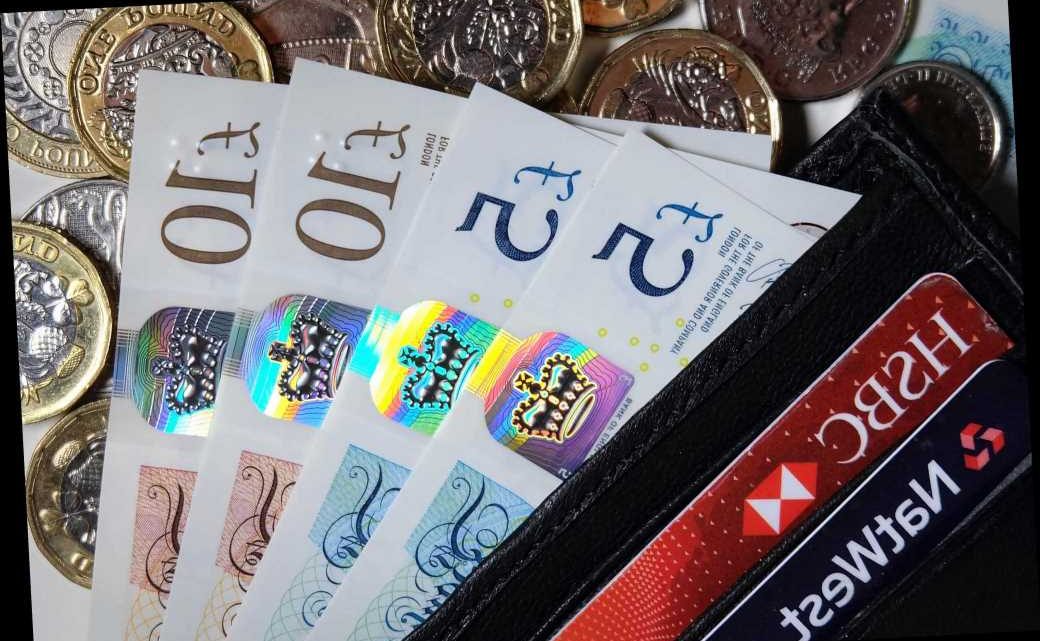
How to survive until payday in January from making extra cash to getting help paying bills
01/04/2021MAKING your money last until payday can be a stretch in January, but there are several ways to help yourself get to the finish line.
From making extra cash to getting help paying bills, it's often possible to get through the rest of the month within getting into debt.
The typical UK household spends almost £740 extra in December, 29% more than the average of £2,500 in a month, according to the Bank of England.
In other words, it's no wonder our wallets are feeling a little flat.
Meanwhile, many people are also paid early in December, meaning it’s an even longer stretch until the next payday.
Below we've made a round-up of easy ways to see yourself survive until payday in January.
Work out how money you have
The first step to budgeting until payday is to work out what money you actually have.
Scrutinise bank and credit card statements to determine where your money is coming from, how much there is and where it is all going.
Many of us overlook the little extras that can send a more balanced budget into the red.
There are also loads of budgeting apps out there, while some banks have their own online or app budgeting functions.
Give up luxuries and unnecessary expenses
Once you know how much is in the bank, it's time to decide which expenses to give up.
Most of us are already spending more time at home due to the government's coronavirus restrictions, which have forced a majority of restaurants, non-essential shops and gyms to close.
This, in turn, may lead some of us to build up extra savings.
Yet you could still save more money by cancelling subscriptions, avoiding takeaways and cooking food with items you already have at home.
Alternatively, grocery shoppers can save cash by snapping up yellow-sticker bargains.
We reveal when supermarkets including Aldi, Asda, Sainsbury's, and Tesco reduce prices.
Shop around for better deals
When money is especially tight, it's also a good opportunity to explore ways in which you can cut back on spending on regular bills.
Can your mobile phone contract be reduced if you shopped around for a new one? Or is there a cheaper broadband or energy deal you could get?
If you haven't switched your energy bill for a few years it's likely you're on an expensive tariff – and can save hundreds of pounds by switching.
How to save on your energy bills
SWITCHING energy providers can sound like hassle – but fortunately it’s pretty straight forward to change supplier – and save lots of cash.
Shop around – If you're on an SVT deal you are likely throwing away more than £300 a year. Use a comparion site such as MoneySuperMarket.com, uSwitch or EnergyHelpline.com to see what deals are available to you.
The cheapest deals are usually found online and are fixed deals – meaning you'll pay a fixed amount usually for 12 months.
Switch – When you've found one, all you have to do is contact the new supplier.
It helps to have the following information – which you can find on your bill – to hand to give the new supplier.
- Your postcode
- Name of your existing supplier
- Name of your existing deal and how much you pay
- An up-to-date meter reading
It will then notify your current supplier and begin the switch.
It should take no longer than three weeks to complete the switch and your supply won't be interrupted in that time.
It may seem a hassle but these small savings could mean the difference between a desperate month and a doable one down the line.
To find the best deals, use comparison sites such as Compare the Market, Go Compare, MoneySuperMarket or uSwitch to find out if you could save.
If you find a better deal, take it to your supplier and see if they will match it. If not, switch to a better supplier when your contract ends.
Ask your supplier for help with bills
If you're already on the cheapest deals and you're still struggling, it's worth asking your provider for help.
Most companies will want to help you find a solution and might even give you a payment holiday or a payment plan so that you can afford to keep up with your payments.
The key is you being proactive and not burying your head in the sand.
Many providers have dedicated teams set up to help people in financial difficulties, but they won't help unless you ask them for it.
Get support with mortgage payments
Homeowners who are struggling financially due to the coronavirus crisis can get a payment holiday of up to six months until July 2021.
The mortgage support is available to any household that hasn't already had a payment break of more than six months.
If you're struggling, you have until March 31, 2021, to apply for a payment holiday, or an extension of a previous payment break.
The extension of the support come into force from November 20, 2020.
What is a payment holiday and should you apply for one?
PAYMENT holidays are when a lender agrees to pause your monthly repayments for a set amount of time.
This has to be agreed in advance, so don't stop making your repayments until your bank has given you permission to do so.
The majority of lenders are offering payment holidays, so get in touch with your bank to find out what help it can give you.
Most of the time, it'll require you to fill out an online form.
Typically, payment holidays are offered in extreme circumstances and are designed as an emergency measure to help you through a difficult financial time.
If you think you need to take one, you should speak to your lender to discuss your options – but do note that the break in payments doesn’t remove any debt or financial obligations.
Most lenders will also still charge interest during this time, so be aware that these costs will keep building up.
You should also always continue to make your normal payments if you’re financially able to.
Sue Anderson, head of media at debt charity StepChange, said: "If you can continue to make your normal payments without difficulty, then you should.
"Any temporary measures being offered by lenders don’t remove financial obligations – they are designed as an emergency measure to help you get through a period where your income may have taken a serious knock.
"However, if you need to use them then you shouldn’t hesitate to talk to your lenders."
Asking for a mortgage holiday shouldn't be taken lightly – you should only really apply for one if you can't afford your repayments.
This is because interest will continue to accrue during your payment break, which means your overall repayments will increase.
In fact, taking a mortgage payment holiday could cost you £2,769 in higher repayments.
If you've already paused your mortgage payments for six months, lenders are being asked to provide tailored support instead, which could be noted on your credit file.
Ask for help with rent costs
Private renters who are struggling should speak to their landlord about support, while social renters should speak to their housing association.
They may be willing to defer payment for a while or allow you to pay a smaller amount until you can get back on your feet.
Due to the pandemic, the government has changed the law to ensure bailiffs don't to enforce evictions in any Tier in England until January 11, 2021.
Given the 14-day notice period required, no evictions are expected to be enforced until 25 January 2021 at the earliest.
However, the rules don't apply where tenants have demonstrated anti-social behaviour or committed fraud, for example.
Make sure you get the benefits you are entitled to
If you’re a low income household then you might be entitled to benefits to help you get by.
The quickest way to see what benefits you may be able to claim is to use one of the three benefit calculators recommended by Gov.uk.
Each one is free to use. They include:
- Turn2us
- Policy in Practice
- entitledto
For each of these, you’ll be asked information about your circumstances, such as your current employment and income.
You’ll also need to give information about yourself, including your age and who you live with.
Once you've used the tools you can use the contact information on Gov.uk to get the ball rolling and apply for what you're owed.
Of course, the tools only provide an indicator of what benefits you can claim – and usually don't include means tested benefits, so you may be entitled to even more.
Some of the benefits that people regularly don't claim include Universal Credit, pensions credit and child credit.
Last year, over eight million people were missing out.
Apply for a grant
There are around 8,000 charities and organisations in the UK that offer cash to help struggling workers who've been made redundant.
Most of the time, you won't need to pay a grant back – but do check this is the case before you apply.
If you're successful, you’ll usually be allowed to spend the money on whatever you need to, but the money is usually provided to help pay bills or buy household essentials like food.
How much a grant is worth depends on the charity or organisation, but Turn2Us told The Sun earlier this year that they're typically between £500 and £10,000.
Turn2Us has a free grants search tool so you can find out what help is available to you.
Make extra cash
If you're still short on cash, it could be time to find extra ways to earn money.
From selling stuff to getting paid to watch TV, we've rounded up four easy ways to make money from home below.
You can check out more ways in our round-up.
Sell your stuff
If you have a load of stuff you no longer need, January is the perfect time to get rid of it.
You've just gotten a load of new stuff for Christmas so make it a case of out with the old, in with the new and make some extra money while you're at it.
Or if you got Christmas gifts you're unhappy with, you can make a lot of money by selling these too.
If you're selling unwanted clothes, you could use sites such as eBay, Shpock, Facebook Marketplace and Depop.
Or if you're looking to get rid of old CDs, Music Magpie offers a courier service so you don't need to leave your home.
Just keep in mind that some of these sites may charge listing fees or take a percentage of any sale, so check first.
Fill out online surveys
Filling out online surveys can be an easy way to make money if you've got spare time.
There are lots of sites you can use, but these are among the most popular: YouGov, i-Say and Swagbucks.
Each survey pays between 5p to £1, depending on the size of the survey and site, so it can take a while to build up your cash.
You also need to check daily for new surveys, so be prepared to put the time in.
Get paid to Google
Yes, you can really get paid to sit on the sofa and browse the internet.
One company which will give you money to Google is Qmee, which is essentially an add-on to your browser.
This add-on then works in the background as you Google and brings up extra results when you start searching.
If you click on one of these results, you'll earn between 4p and 15p – and sometimes as much as £1.
It could take a while for any earnings to add up to a substantial amount, but it could be worth it if you have spare time on your hands.
The cash is paid to you via Paypal, with can be transferred into your main current account.
Get paid to watch TV
If you're a telly addict, you could be making money by sharing your opinions on the latest shows.
The Viewers puts together research panels for broadcasters and programme makers so they can get feedback on TV programmes.
So not only could you be making money from watching TV, you could get a sneak peak of the latest shows before they air.
You can earn up to £50 for taking part in a 90-minute research panel via Zoom, £10 for a programme review of an hour-long show, or between £1 and £3 for a survey.
Payment options include bank transfer, PayPal, Amazon or flexible gift vouchers redeemable at most retailers.
If you need to borrow, do it wisely
It can be tempting to seek shortcuts when you're struggling, and a loan should be considered a last resort.
But if you really not able to pay for everything in January, you can get personal loans to see you through a set period.
You should try to avoid payday loans though, as the interest rates on those are usually extortionate high, meaning you may end up in a worse situation than you started out with.
To find the cheapest loans, use a comparison site such as Moneyfacts or MoneySuperMarket.
Just remember that all loan rates are "representative", which means that only 51% cent of successful applicants have to get the rate, so you could successfully apply but then still get a more expensive deal.
Also keep in mind that applying for a loan can leave an impact on your credit rating, so do your research first.
You can also speak to your bank about getting an overdraft – but beware that many lenders have increased their fees and interest rates.
Whatever you borrow, be sure to create a budget for paying it back before you take the plunge.
From saving to paying off your debts – we explain how to fix your finances in 2021.
We also round up 12 key financial changes in 2021 that you need to look out for, including a Universal Credit boost and tax hikes.
Looking to start saving this year? Here's how to save £1,500 in 12 months with the 365 day challenge.
Source: Read Full Article


